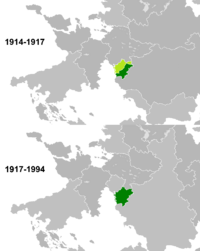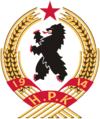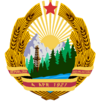Socialist Republic of Krovech
Krovak People's Republic (1914-1921) Socialist Republic of Krovech (1921-1994) | |||||||||
|---|---|---|---|---|---|---|---|---|---|
| 1914–1990 | |||||||||
 | |||||||||
| Capital | Algrade | ||||||||
| Demonym(s) | Krov, Krovak | ||||||||
| Government | Federal Marxist–Leninist one-party socialist directioral republic under a benevolent dictatorship | ||||||||
• 1914-1929 | Kristijan Stevanović | ||||||||
• 1929-1930 | Nebojša Borisov | ||||||||
• 1930-1990 | Franko Kresimir | ||||||||
| Historical era | Great Game | ||||||||
• Established | 1914 | ||||||||
• Disestablished | 1990 | ||||||||
| Population | |||||||||
• 1914 | 1,563,872 | ||||||||
• 1921 | 9,203,000 | ||||||||
| |||||||||
| Today part of | |||||||||
The Socialist Republic of Krovech (Krov: Социјалистичка Република Кровеч, СРК , romanized: Socijalistička Republika Kroveč) was a Federal Marxist–Leninist one-party socialist republic in Berea that existed in Krovech from 1921 to 1990. It was also known as the Krovak People's Republic from 1914 to 1921. Following a coup d’etat in 1914, the Workers Peasants Party of Krovech took over the nation and was later declared a socialist republic formally after the April 4th Constitution in 1921. It laid claim on the ethnic Krovak territories of the Condominium of Pomoria amidst the Dulebian Civil War prompting takeover and later solidifying its modern day borders after the Treaty of Lehpold. The Socialist Republic was geographically bordering Dulebia to its north and overlooked the Endotheric Sea to the west. Following the reforms in Lyonia, the nation under its Kresimir regime would increasingly go isolationist and abusive against its dissidents within the 90s, shortly leading to its violent overthrow in 1990.
Part of a series on the |
|---|
| History of Krovech |
| Timeline |
History

Prior to the August coup in 1914 the government originally inhabiting the territories prior was under an inefficient semi-presidential republic functioning as a buffer state between the rivaling empires of the Dulebian and weakening Gurkhan empires existent since 1900. Its inception was created after the Third Gurkho-Dulebian War after successfully gaining its independence. Many of the land to the west, however, was taken by the Dulebians to be included in the Condominium of Pomoria for its coasts to have influence in the Endotheric. This naturally upsetted many Krovaks who had just won their independence and lacked it spoils for Dulebias ambitions.
The Workers Peasants Party of Krovech or WPPK leader(s) Kristijan Stevanović and Nebojša Borisov at this time had already criticized the stability and had linked themselves to Krovak nationalism while still attempting to work within its democratic system. Later, giving ideas to communist revolution around the culminating failures of the buffer state would lead to its ban in 1913
Within the outbreak of the Great War, Krovech would be in the middle of the fighting erupting between the rival empires of Dulebia and the Gurkhanate. This period is marked by civilians caught in brutal crossfire within their campaigns. With the lack of action done by the republic and the dissatisfaction among the population the government was quickly widely disliked. By 1914 both great powers exited out of the war with the buffer state left in ruins. Around this time the outlawed Workers Peasants Party of Krovech from parliament had begun to lead a disputed power struggle against the government. It held a favorable grip in politics because of their position in unifying a whole Krovech with the ethnic Krovak lands of Pomoria. The WPPK leaders had already worked over a seizure of power and cooperated with belligerent officers within the Army of the Krovak Republic.
With many pro-communist demonstrations mounting at the same time in 1914 the main opposition to these were the few single government ministers and rural farmers against the spoken collectivization programs by the WPPK. Many backers of the demonstrations had also seen the outcomes of unsuccessful reconstruction programs attempted within the string of months and smaller scale arrests of earlier protests. The last attempted actions done by the loose government were to make arrests of the outlawed WPPK leaders for conspiracy, however this would've be mainly looked down upon and quickly worsened the tension. Those loyal enough to the intensified movement and armed would’ve already begun to organize high level communist militias in favor of the disputed communist government. Brđanin, fearful of being caught in a civil war similar to their neighbors north had already started to consider a begrudging agreement with a newly formed communist government. Shortly on the summer day of August 12th he capitulated to WPPK leaders and the Krovak People's Republic would be proclaimed.



